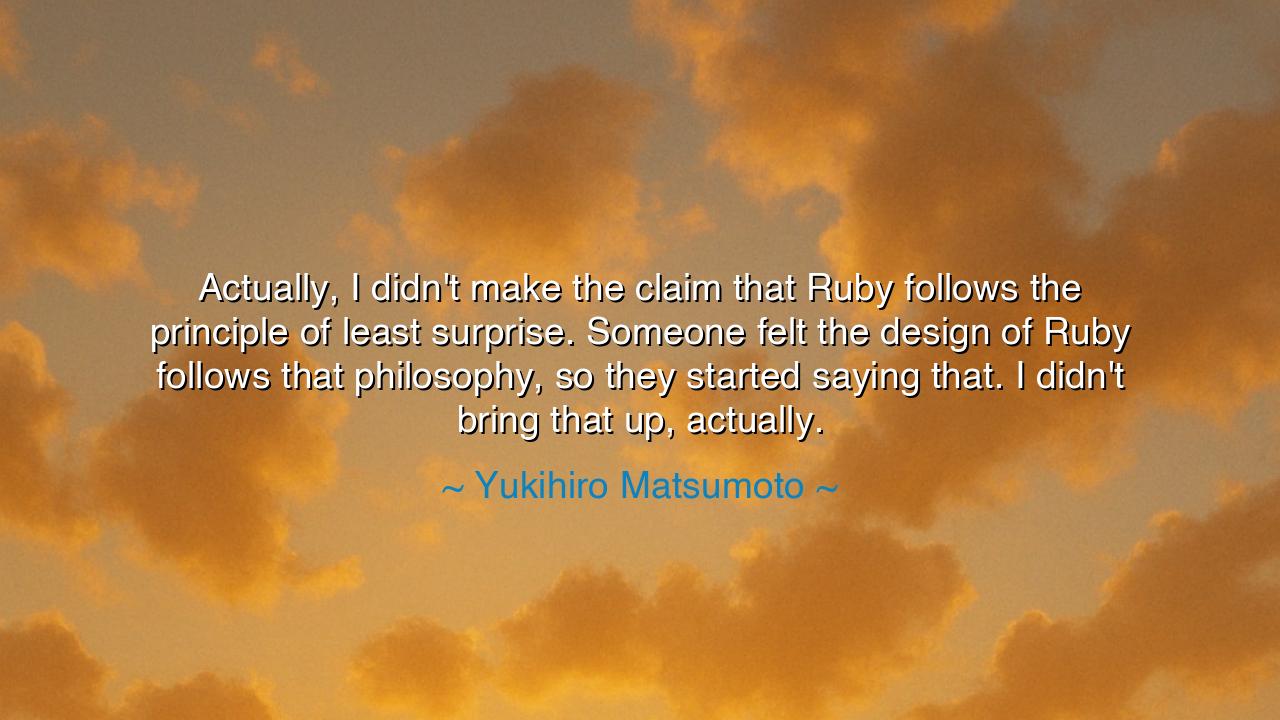
Actually, I didn't make the claim that Ruby follows the principle
Actually, I didn't make the claim that Ruby follows the principle of least surprise. Someone felt the design of Ruby follows that philosophy, so they started saying that. I didn't bring that up, actually.






The creator of Ruby, Yukihiro “Matz” Matsumoto, once said: “Actually, I didn’t make the claim that Ruby follows the principle of least surprise. Someone felt the design of Ruby follows that philosophy, so they started saying that. I didn’t bring that up, actually.” At first glance, this may seem a humble correction about a misunderstanding. Yet within these words lies a deeper truth about intention, perception, and the nature of creation itself. Matz, the quiet craftsman of code, reminds us that what is made by one heart is often interpreted by another—and that the meaning others find in our work may go beyond what we ever intended.
The Principle of Least Surprise is an idea from the ancient logic of design—that a system should behave in the way its users naturally expect. Simplicity, clarity, and predictability are its virtues. When users encounter Ruby, many found it to be intuitive, elegant, and filled with unexpected grace. They assumed this harmony must have been Matz’s deliberate philosophy, the principle guiding every line. But in his gentle correction, Matz reveals that this was not a conscious adherence to theory—it was born from compassion, from his desire to make programmers happy. He built Ruby not from doctrine, but from empathy. And therein lies the subtle greatness of his craft: it was humanity, not philosophy, that gave birth to its beauty.
This distinction echoes through the history of invention and art. Leonardo da Vinci never claimed to follow the “rules” of the Renaissance; yet his works embodied them more perfectly than those who did. Bach did not seek mathematical symmetry, yet his music dances in perfect proportion. Great creators often shape wonders not by obeying principles, but by following their inner sense of harmony. The principles are named later, by those who seek to explain what the artist felt instinctively. Matz’s humility reflects this timeless truth: the deepest wisdom flows not from calculation, but from sincerity.
In his words, there is also a quiet warning against dogma. When we cling too tightly to principles, we lose the freedom to create. Matz reminds us that rules are not sacred—they are reflections of what works, not the source of it. He did not build Ruby to fit into an academic ideal; he built it to make life joyful for programmers. And in that joy, others found their own meaning. The principle of least surprise, then, was not his commandment—it was the world’s gratitude made manifest.
Consider, too, the humility in his response. Many would have claimed the credit for a beautiful idea others bestowed upon them. But Matz chose truth over glory, clarity over myth. He understood that creators are only the first voice in a long conversation. Once released into the world, their work belongs also to those who use it, interpret it, and build upon it. His refusal to claim ownership over others’ interpretations reveals not only integrity, but an understanding of collaboration across time—that all creation is a dialogue between maker and user, between thought and experience.
From his modest words, we learn a lesson of authenticity: create not to impress, but to express. Do not chase theories; chase truth. When your work is made with honesty and care, others will find meaning in it, perhaps even beyond what you imagined. The true artist does not design to satisfy an abstract principle, but to meet the needs of the living world—and in doing so, their work becomes timeless.
So, let this teaching endure: Do your work with love, and let the world name its meaning. Whether you write code or poetry, paint walls or dreams, create as Matz did—guided not by the cold compass of doctrine, but by the warmth of purpose. Principles are born from passion, not the other way around. The truest creation, as Matz teaches, is not designed to surprise or to please—it is designed to serve, to connect, and to endure.






AAdministratorAdministrator
Welcome, honored guests. Please leave a comment, we will respond soon